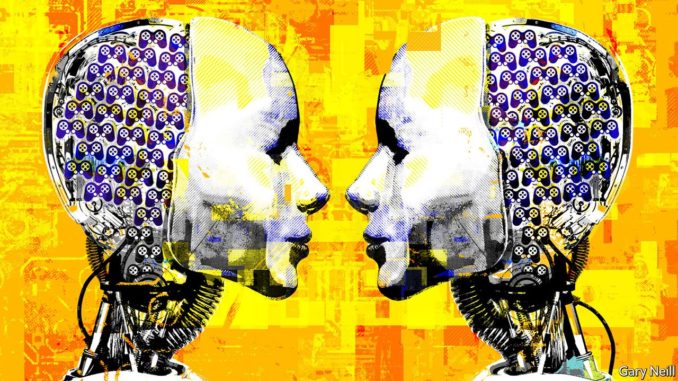
A lot of media has a very similar vision of what the future of video games will look like. The Star Trek series has the Holodeck, Ready Player One depicted a perfect immersive VR experience, and Black Mirror saw it as a neurological experience. All of them have one thing in common. An adaptive, responsive and intelligent A.I. that can create unique and realistic gameplay. As crazy and farfetched as some of the ideas may seem, there is an old adage to keep in mind: ‘Science Fiction begets Science’. And in this case, it may very well be true.
Artificial Intelligence and video games are not a recent marriage. It can be safely said that without A.I., video games would either be extremely dull or not exist at all. Though crude and simplistic in its design and application, Pong, one of the first video games ever released utilized A.I. to control the opposing paddle. Or Pac-Man, where the A.I would attempt to corner and seal in the user as the ghosts. If you have played any video game that has ever come out, then you have interacted with A.I. on some level.
However, it is a common misconception to put video game A.I. in the same boat as the A.I. that is used in other more academic fields (e.g. medical, self-driving cars, military etc.). The main difference between the two distinctions can be simplified to two key points: The former focuses on gameplay and user interaction and experience, while the latter utilizes machine learning and pragmatism. But this divide is closing between the two types. And that means great things for video games and players.
As mentioned previously, video game A.I. has already been developed that utilizes (to greater extents daily) the practice of machine learning and applied knowledge. Shadow of Mordor Developers, Monolith Productions have created an A.I. specifically for the video game aptly named “Nemesis System”. The A.I. monitors all NPC’s that the main character interacts with on a battlefield. Those not killed, survived interactions with player, killed or wounded the player and so forth are specifically monitored. Those NPC’s would then be promoted, given strength or armour upgrades, and would hunt out the protagonist with vengeance and purpose. Although this system was only used for the Shadow of Mordor series, its existence is conceptual proof that deep learning and applied knowledge not only benefited the gameplay but enhanced the users' interactions.

The unification of the two ideas of game experience and deep learning is now becoming more common in video games. As these two ideologies form into a singular vision, the gaming industry is set to optimize its further utilization of A.I. This can be done in a programing level as well as player interaction. As of right now, most game developers utilize multiple A.I. systems for each game. To make it simple, one controls such matters as NPC’s and the game atmosphere. The other is based more on the actual gameplay; the puzzles, combat and such. With both A.I. systems working independently of each other and solely for one game. However, if both systems were married into one, and the applications of machine learning and problem-solving were applied, a unique and challenging experience could unfold in each game.
There are still a few kinks to work out. As bright as the future for video games does appear to be, communication between two separate A.I. Systems (e.g. vehicle – to - vehicle) is still quite far from perfection. Let’s not forget that a few years ago Facebook had to shut down a simple experiment between two of their A.I. chatbots. Why you may ask? Because the bots stopped using any known language, composed their own and were using it to communicate. This does not mean that video games will not continue to improve. It just means that we have to wait a little bit longer for science to catch up with science fiction. And that wait may not be all that long. Have you ever met Sophia? She's the world's first AI Humanoid robot and is also an accepted citizen of Saudi Arabia. In the provided interview with Tony Robbins, she is able to easily hold a conversation that ranges from topical to existential in nature.
And so, the question remains, what role will A.I. play when it comes to video games of the near future? And the answer also remains, without A.I., there are no video games. And with the many advances that are still being established within the many fields and applications of artificial intelligence, it seems unlikely that the marriage between the two will end any time soon.
If video games are your passion, you found this article interesting, or just enjoy reading well-researched work take a look at some of these other insightful pieces:
Education in Video Games: http://www.senecajournalism.ca/bringing-games-into-the-classroom/
Technology in Video Games: http://www.senecajournalism.ca/video-games-is-t…ure-actually-now/
E-Sports A Growing Industry: http://www.senecajournalism.ca/esports-a-growing-industry/
E-Sports Narrative Vs Multiplayer http://www.senecajournalism.ca/multi-player-esports-vs-single-player-narrative-the-evolution-of-video-games/





Be the first to comment